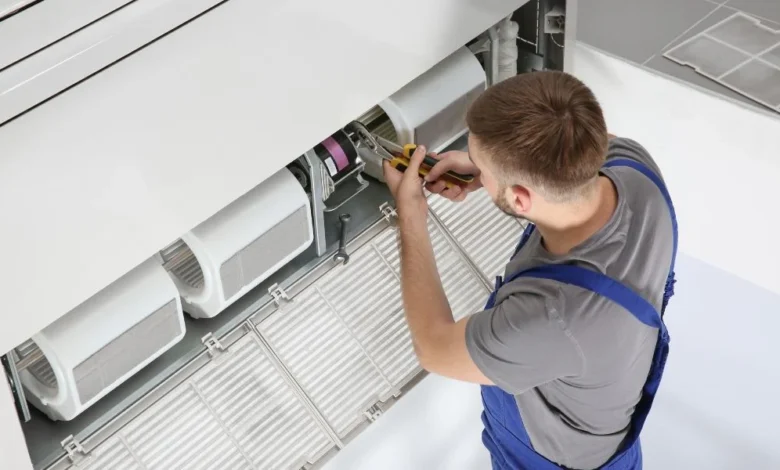Maximizing Energy Efficiency: Tips For Your Heating And Cooling System

Energy efficiency is not just a buzzword—it’s a critical part of managing your home’s comfort and utility bills. To keep your home cool and warm, you need to use a lot of energy. Making sure your system works well can help the environment and your wallet. Whether you’re looking to reduce energy waste or simply make your home more comfortable, maximizing the efficiency of your heating and cooling system is essential. Here are practical tips to ensure your system runs optimally and efficiently all year round.
Upgrade to a Programmable Thermostat
If you want to save energy, a controlled thermostat can make all the difference. By allowing you to set different temperatures for various times of the day, you can avoid wasting energy when you don’t need full heating or cooling.
For example, in the winter, you can lower the temperature when you’re away from home or sleeping, and in the summer, you can reduce the cooling settings when the house is empty. Many modern thermostats allow remote control through smartphone apps, giving you even more flexibility in managing your home’s energy usage.
Even better, smart thermostats learn your habits and change the temperature on their own based on how you live your life. While these upgrades require an initial investment, they often pay for themselves over time through energy savings.
Ensure Proper Ventilation
Good ventilation is another essential factor in energy efficiency. Ventilation helps to regulate airflow and ensure that your home maintains a comfortable temperature without straining your system.
When furniture, drapes, or rugs get in the way of your vents or registers, they can make your HVAC system work harder. Make sure they are clear. Additionally, consider installing a ventilation system that brings fresh air into your home while reducing energy losses. An energy recovery ventilator (ERV) or heat recovery ventilator (HRV) can help maintain indoor air quality while conserving energy.
Use Ceiling Fans to Your Advantage
Ceiling fans and your HVAC system can work together to save you the most energy. Fans make rooms feel cooler in the summer by creating a wind-chill effect. This lets you raise the thermostat a few degrees without losing comfort.
Most ceiling fans have a setting that turns them around so that warm air flows back into the room in the winter. This can make you feel warmer without turning up the heat, which saves even more energy. Keep in mind that ceiling fans cool people, not rooms, so turn them off when you leave a room to save power.
Consider Zoning Systems
Your home is split into different places, or “zones,” by zoning systems, and you can change the temperature in each zone separately. This is especially helpful for bigger homes or homes with rooms that aren’t used very often.
By only heating or cooling the zones that need it, you can save a significant amount of energy. Zoning systems work by using dampers in the ductwork to direct airflow and separate thermostats to control the temperature in each zone. If your home doesn’t currently have a zoning system, consult with an HVAC professional about whether this upgrade could be beneficial.
Maximize Natural Heating and Cooling
You can use your home’s natural heating and cooling systems to your benefit. In the winter, let in sunlight by opening curtains on south-facing windows to naturally warm your home. At night, close the curtains to retain the heat. In the summer, close blinds or curtains during the day to block out heat and prevent your home from becoming overly warm.
You can also use landscaping to help regulate the temperature inside your home. When you plant trees and plants in the right spots, they can stop the wind in the winter and give you shade in the summer. This will make your heating and cooling system work less hard.
Upgrade to Energy-Efficient Equipment
If your system is more than 10 to 15 years old, you might want to think about getting a new one. It is much more energy-efficient to use new HVAC systems than older ones. You should look for a new air conditioner with a high Seasonal Energy Efficiency Ratio (SEER) and a yearly fuel utilization efficiency (AFUE) if you want to stay cool.
Additionally, consider investing in a heat pump, which can provide both heating and cooling and is highly energy-efficient. Geothermal heat pumps, in particular, use the earth’s constant temperature to regulate your home’s temperature and can dramatically reduce energy consumption.
Limit the Use of Heat-Generating Appliances
During the warmer months, don’t use ovens, stoves, clothes dryers, and other machines that make heat when it’s very hot outside. Dishwashers and washing machines should be used at night, when it is cooler, instead. You can also keep your home cooler and your air conditioner running better by cooking outside on a grill.
Take Advantage of Rebates and Incentives
A lot of utility companies give rebates and other incentives to people who install or upgrade HVAC systems that use less energy. These incentives can help offset the cost of purchasing new equipment or making energy-efficient upgrades.
Before starting any major projects, check with your local utility provider to see what programs are available. Additionally, many governments offer tax credits for energy-efficient home improvements, so be sure to explore these options as well.
Conclusion
Maximizing energy efficiency for your heating and cooling system requires a combination of proper maintenance, smart upgrades, and practical changes to your daily routine. By following the tips outlined above, you can not only save on energy costs but also extend the life of your heating and air conditioning system while keeping your home comfortable all year round.
Over time, small changes like regular cleaning and changing the settings on your thermostat can have a big effect. Larger purchases, like getting a programmable thermostat or setting up a zoning system, can save you a lot of money and energy in the long run. These tips will help your home and the world by using energy more efficiently. It is worth the time to incorporate them into your daily life.


